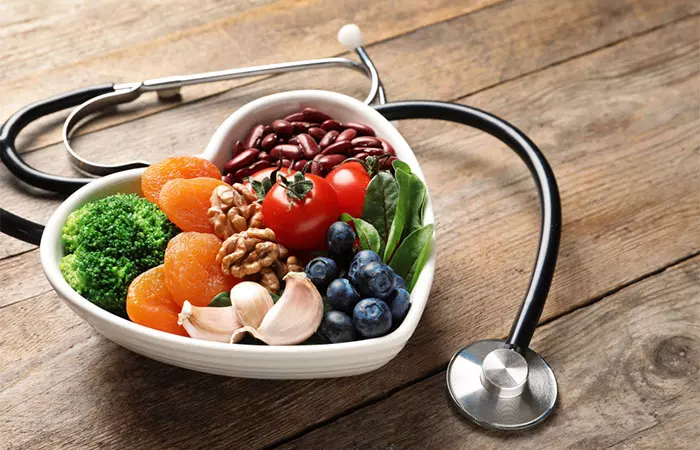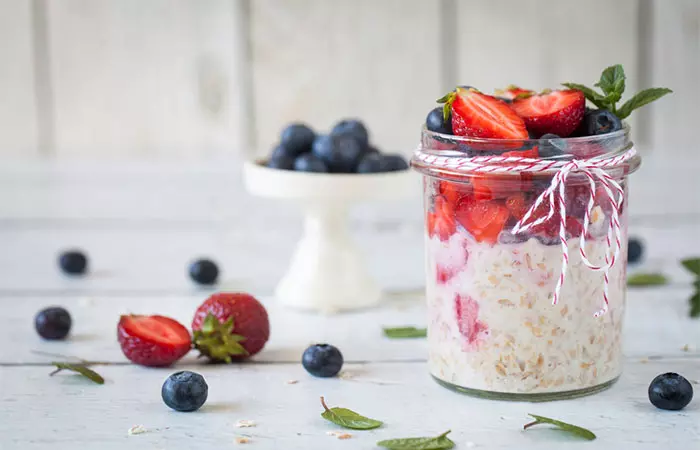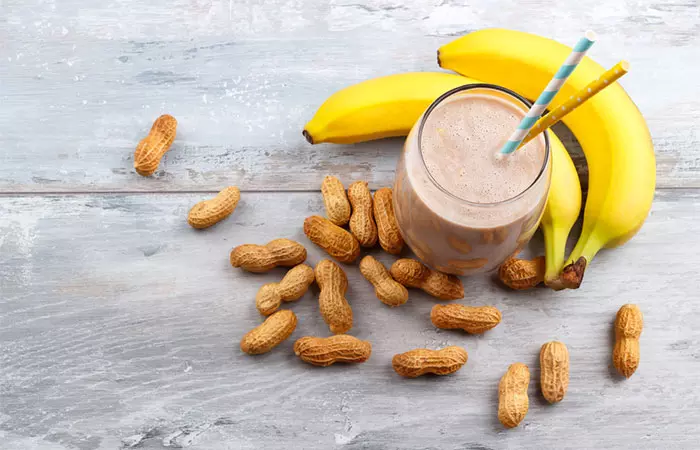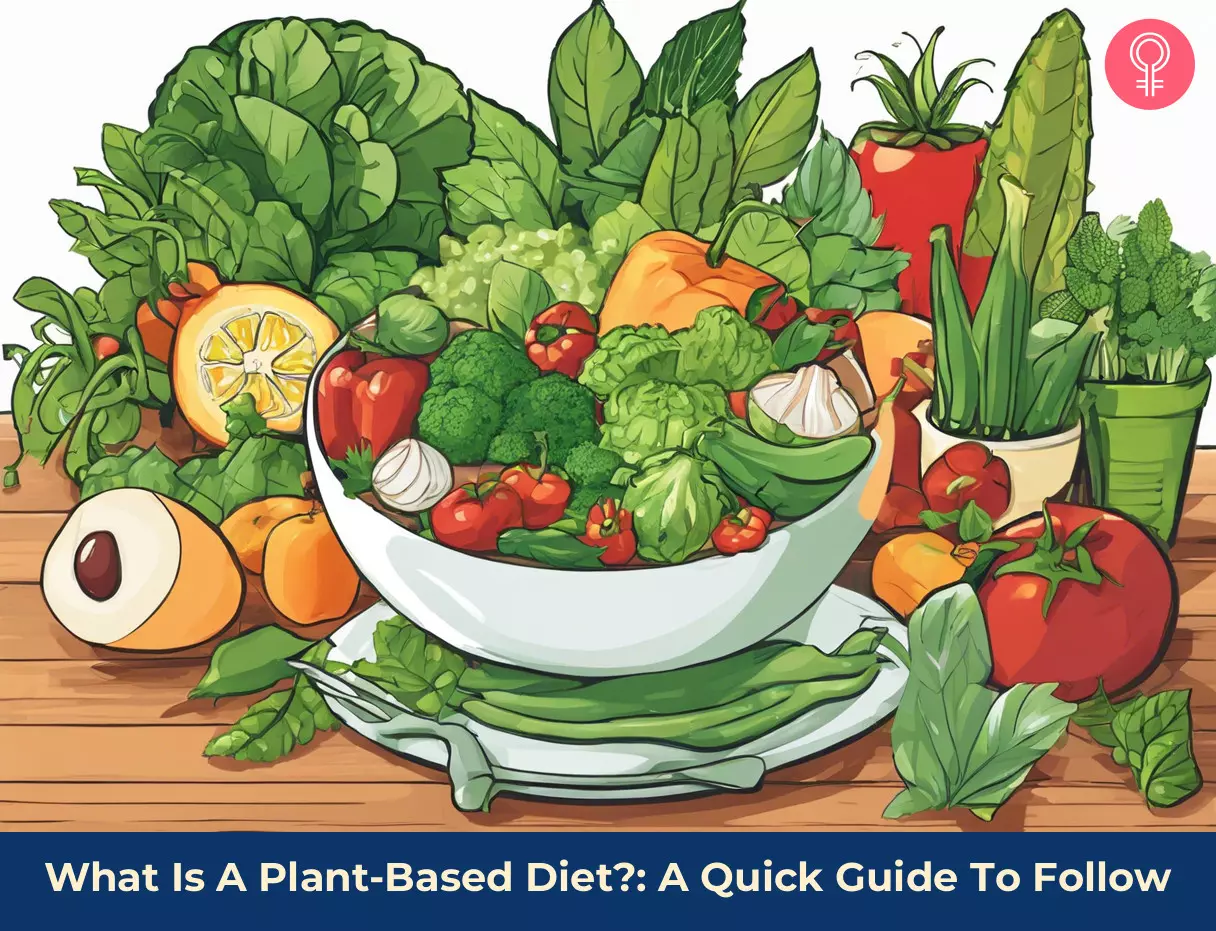Additionally, plant-based diets are considered more environmentally sustainable as they require fewer resources and produce fewer greenhouse gasses while cultivating these foods. Ethical concerns about animal welfare have also driven many people to adopt this eating pattern.
What Is A Plant-Based Diet?
A plant-based diet emphasizes eating foods that come from plants, like fruits, vegetables, grains, pulses, nuts, and seeds. It is a healthy way of eating because it focuses on natural, unprocessed foods and avoids sugary, fatty, and highly processed foods. A plant-based diet encourages you to eat a wide variety of colorful plant foods that are like nature’s multivitamins. They are packed with vitamins, minerals, fiber, and antioxidants that keep you healthy. This way of eating can also help you maintain a healthy weight and support good digestion. In addition, this diet is heart-friendly as it is low in saturated fats and cholesterol. Also, the antioxidants in plant foods protect you from various diseases. There is an array of benefits that can be reaped from a plant-based diet. Learn about these in detail in the section below.
Health Benefits Of A Whole-Food Plant-Based Diet
1. May Help Promote Cardiovascular Health
A whole-food plant-based diet is renowned for its heart-healthy benefits. Research indicates that this dietary approach may lead to significant reductions in risk factors for heart disease, such as high LDL (bad) cholesterol levels and elevated blood pressure (1) . A study published in the Journal of the American Heart Association demonstrated that individuals adhering to a plant-based diet experienced a reduced risk of developing heart disease. This is attributed to the absence of saturated fats found in animal products and the abundance of heart-protective nutrients like fiber, antioxidants, and unsaturated fats in plant-based foods (2).
2. May Help Promote Brain Health
Plant-based diets are good for your brain. A study in the Frontiers in Aging Neuroscience in 2014 found that people who eat lots of plant-based foods perform better on cognitive tests and are less likely to experience memory decline with age (4).
3. Helps In Managing Type 2 Diabetes
Whole-food plant-based diets have shown promise in preventing and managing type 2 diabetes (5). The high fiber content in plant-based foods also helps improve insulin sensitivity and blood sugar control (6). Moreover, a study published in the Journal Of Geriatric Cardiology stated that people following plant-based diets had a lower risk of type 2 diabetes (7). The diet requires people to reduce the intake of processed foods, which are high in refined sugars and unhealthy fats, which contributes to better blood sugar regulation and management.
4. May Reduce The Risk Of Cancer
A study showed that a diverse plant-based diet is associated with a reduced risk of certain cancers (8). Plant-based diets, rich in antioxidants and fiber, have demonstrated a protective effect against breast, prostate, and colon cancers (9). This is because plant foods contain compounds that may counteract the cancer-promoting processes in the body. Additionally, exclusion of processed meats and high-fat animal products contributes to a lower cancer risk.
5. May Improve Longevity
Adherence to a whole-food plant-based diet is linked to a longer life. Research shows a reduced risk of overall mortality among individuals following these dietary patterns.The diet’s favorable impact on heart health, weight management, and chronic disease prevention collectively contribute to an extended lifespan. In addition, the nutrient-rich and anti-inflammatory properties of plant-based foods play a crucial role in supporting overall well-being and longevity, making them an optimal choice for those aspiring to live a longer, healthier life (10).
6. May Improve Immune System Function
A plant-based diet provides essential nutrients, such as vitamins, minerals, and phytonutrients, that enhance the immune system. These components fortify the body’s defenses against infections and diseases. Research supports the immune-enhancing attributes of plant-based diets, making them a popular choice to improve overall health (11).
7. Helps Reduce Inflammation
Chronic inflammation is a common factor in various health conditions. Plant-based foods contain anti-inflammatory compounds, such as polyphenols and omega-3 fatty acids, that mitigate inflammatory responses. These compounds contribute to a decrease in inflammation markers, reducing the risk of conditions like heart disease and diabetes (12).
8. Helps Improve Cholesterol Profile
Plant-based diets can have a positive impact on your cholesterol levels. Unlike animal-based foods, plant-based foods are lower in dietary cholesterol and may help reduce LDL (bad) cholesterol levels in the body. This contributes to an improved cholesterol profile (13).
9. Boost Gut Health
Plant-based diets are rich in essential components like fiber, prebiotics, and polyphenols (14). These elements play a crucial role in supporting beneficial gut bacteria that help improve digestion. Additionally, nutrient absorption is enhanced and the risk of digestive discomfort is reduced. Thus, emphasizing plant-based foods in your diet actively contributes to the well-being of your digestive system and overall health. To reap all these benefits and to adhere to a plant-based diet, you need to know a few things before starting the diet. Check out the next section to know more.
How To Start A Plant-Based Diet
In addition to following all these tips, you need to know what foods you can eat on a plant-based diet. Check them out in the section below.
Plant-Based Diet Food List
These are the foods you can have in a day while following a plant-based diet: Fruits
Apples (1 medium) Bananas (1 medium) Berries (e.g., strawberries, blueberries) (1/2 cup) Citrus fruits (e.g., oranges, grapefruits) (1 medium fruit) Mangoes (1 medium) Pineapples (1 cup, diced) Papayas (1 cup, diced) Cherries (1/2 cup) Grapes (1 cup)
Vegetables
Leafy greens (e.g., spinach, kale, lettuce) (1 cup, raw or cooked) Broccoli (1 cup, chopped) Cauliflower (1 cup, chopped) Carrots (1 medium) Bell peppers (1/2 cup, sliced) Tomatoes (1 medium) Cucumbers (1/2 cup, sliced) Zucchini (1/2 cup, sliced) Eggplants (1 cup, diced) Onions (1 medium)
Whole Grains
Oats (1/2 cup, dry) Brown rice (1/2 cup, cooked) Quinoa (1/2 cup, cooked) Whole wheat pasta (1/2 cup, cooked) Barley (1/2 cup, cooked) Farro (1/2 cup, cooked) Millet (1/2 cup, cooked) Whole grain bread (1 slice)
Legumes
Chickpeas (1/2 cup, cooked) Lentils (1/2 cup, cooked) Black beans (1/2 cup, cooked) Kidney beans (1/2 cup, cooked) Soybeans (1/2 cup, cooked) Peas (1/2 cup, cooked) Edamame (1/2 cup, cooked)
Nuts and Seeds
Almonds (1 ounce, about 23 almonds) Walnuts (1 ounce, about 14 halves) Cashews (1 ounce, about 18 cashews) Chia seeds (2 tablespoons) Flaxseeds (2 tablespoons) Pumpkin seeds (1 ounce, about 85 seeds) Sunflower seeds (1 ounce, about 170 seeds)
Plant-Based Protein Sources
Tofu (3-4 ounces) Tempeh (3-4 ounces) Seitan (3-4 ounces) Plant-based protein powder (as per product instructions) Textured vegetable protein (TVP) (as per product instructions)
Plant-Based Dairy Alternatives
Almond milk (1 cup) Soy milk (1 cup) Coconut milk (1 cup) Oat milk (1 cup) Cashew cheese (1 ounce) Vegan yogurt (6 ounces)
Healthy Fats
Avocado (1/4 to 1/2 avocado) Olive oil (1-2 tablespoons) Coconut oil (1-2 tablespoons) Nut butters (e.g., peanut, almond, cashew) (2 tablespoons)
A plant-based diet is also popular for shedding some pounds. Learn how it can help you lose weight in the next section.
Plant-Based Diet For Weight Loss
Promotes Satiety: This diet increases the gastrointestinal hormones that are involved in the regulation of glucose metabolism and satiety (15). Reduces Saturated Fat Intake: Plant-based diets have lower amounts of saturated fats, which are known to contribute to weight gain (16). Minimizes Processed Food Intake: Processed foods, which are known to cause weight gain, are limited or eliminated on this diet, thus reducing overall calorie intake and promoting weight loss (17). Reduce BMI: Studies show that individuals following plant-based diets tend to have a lower body mass index (BMI)i Measure of body fat based on an individual’s weight and height. and are at a reduced risk of obesity (18). Is Sustainable: Plant-based diets support sustainable weight loss when combined with portion control and regular physical activity.
To reap the benefits of a plant-based diet, you need to follow a diet plan that is curated to provide good nutrients in all the meals of the day. Check out the sample meal plan in the section below.
7-Day Plant-Based Diet Meal Plan
In addition to these meal ideas, there are a few more yummy recipes in the section below. Check it out.
Plant-Based Diet Recipes
Breakfast: Vegan Overnight Oats
Ingredients
1/2 cup rolled oats 1 cup almond milk (or any plant-based milk) 1 tablespoon chia seeds 1/2 teaspoon vanilla extract A handful of mixed berries 1 tablespoon maple syrup (optional) Chopped nuts (e.g., almonds, walnuts) for topping
How To Prepare
Lunch: Chickpea and Quinoa Salad
Ingredients
1 cup cooked quinoa 1 can (15 oz) chickpeas, drained and rinsed 1 cup cherry tomatoes, halved 1 cucumber, diced 1/2 red onion, finely chopped Fresh parsley, chopped Juice of 1 lemon 2 tablespoons extra virgin olive oil Salt and pepper to taste
How To Prepare
Snack: Peanut Butter Banana Smoothie
Ingredients
2 ripe bananas 2 tablespoons peanut butter 1 cup almond milk (or any plant-based milk) 1 tablespoon chia seeds 1 tablespoon honey (or maple syrup for a vegan option) Ice cubes (optional)
How To Prepare
Dinner: Vegan Lentil Curry
Ingredients
1 cup dried green or brown lentils 1 onion, finely chopped 3 cloves garlic, minced 1 tablespoon fresh ginger, grated 1 can (15 oz) diced tomatoes 1 can (15 oz) coconut milk 2 tablespoons curry powder 1 teaspoon ground turmeric Salt and pepper to taste Fresh cilantro leaves for garnish Cooked brown rice or quinoa for serving
How To Prepare In addition to following a meal plan and exploring various food recipes, there are a few tips that can help beginners with a plant based diet. Check them out in the next section.
Tips For A Plant-Based Diet For Beginners
Diversify Protein Sources: Ensure you eat an array of plant proteins like beans, lentils, tofu, and quinoa to obtain a broad spectrum of amino acids essential for bodily functions. Prioritize Whole Grains: Opt for whole grains such as brown rice, oats, and whole wheat pasta to provide complex carbohydrates, fiber, vitamins, and minerals for sustained energy. Include Legumes: Embrace legumes like chickpeas, black beans, and lentils for their protein content, fiber richness, and versatility in creating satisfying meals. Include Nutrient-Packed Nuts and Seeds: Incorporate nuts (walnuts, almonds) and seeds (flaxseeds, chia seeds) into your daily diet for their healthy fats, plant-based protein, and micronutrientsi Essential vitamins and minerals required by the body in small quantities for proper functioning . Select Fortified Plant-Based Dairy: Choose fortified dairy alternatives made from almonds, soy, or oats to ensure adequate calcium (120 mg/100 ml) and vitamin D intake. Include Smoothies: Create nutrient-packed smoothies with leafy greens, antioxidant-rich berries, plant-based protein powder, and healthy fats like avocado to kickstart your day. Strategically Plan Meals: Craft well-balanced meals consisting of a protein source (tempeh, edamame), complex carbs (quinoa, whole grain bread), and a rainbow of vegetables for optimal nutrition. Home Cooking Skills: Invest time in mastering plant-based cooking techniques to control ingredients, minimize additives, and explore creative, homemade recipes. Check The Labels: Scrutinize food labels for hidden animal-derived ingredients in processed items like sauces, soups, and snacks to maintain a truly plant-based diet. Consult A Registered Dietitian: Seek guidance from a registered dietitian experienced in plant-based nutrition to ensure you’re meeting all your nutrient requirements through your dietary choices.
Like any other diet, this diet also comes with its own pros and cons. To know them in detail, check out the section below.
Pros And Cons Of A Plant-Based Diet
Pros:
Opting for a plant-based diet can be a boon for your heart. It cuts down artery-clogging saturated fats and cholesterol, thereby reducing the risk of heart diseases. If you are looking to shed some pounds or maintain a healthy weight, plant-based diets can be your ally. They are often rich in fiber and light in calories, helping you feel full while managing your calorie intake. These diets come with a built-in shield against chronic diseases like type 2 diabetes, certain cancers, and high blood pressure. It’s like a long-term insurance policy for your health. Going plant-based is also a planet-friendly choice. It requires fewer resources and generates fewer greenhouse gas emissions, making it an environmentally responsible choice. For many, choosing a plant-based diet is about aligning their dietary choices with ethical concerns about animal welfare. It’s a way of living that feels right on a personal level.
Cons:
While plant-based diets offer numerous benefits, they require careful nutritional planning to ensure you get vital nutrients like vitamin B12, iron, iodine, omega 3, zinc, choline, and calcium. An improperly followed diet may lead to nutrient deficiencies. Eating out or navigating social gatherings might need a bit more effort, as plant-based options can be limited. But with some savvy planning, you can still enjoy social dining. As you embrace more plant-based foods, your digestive system may need a little time to adapt to higher fiber intake. It’s like a gentle nudge for your gut and may affect your bowel movements due to an increase in fiber content. Plant-based diets can include processed foods, which might be high in sugars, unhealthy fats, or additives. It’s essential to choose wisely and favor whole, natural foods. If your cultural or family traditions center around meat-based meals, transitioning to plant-based eating might raise some eyebrows. Be prepared for a few family discussions.
Can you still eat meat on a plant-based diet? In general, plant-based diets minimize meat and prioritize plant foods for their nutrition. This dietary approach is centered around vegetables, fruits, grains, legumes, nuts, and seeds while avoiding or significantly reducing animal products like meat, poultry, and seafood. However, a few follow a flexitarian approach while following this diet. Is peanut butter on a plant-based diet? Yes, natural peanut butter without additives is plant-based and a good protein source. Plant-based diets typically include peanut butter made from pure, ground peanuts without added oils or sugars. It’s a valuable source of plant-based protein and healthy fats. What kind of bread do you eat in a plant-based diet? Choose whole-grain or whole-wheat bread for a plant-based diet for added nutrients. These breads offer more fiber, vitamins, minerals, and nutrients compared to refined white bread. Can you eat bananas on a plant-based diet? Yes, bananas are a staple in plant-based diets due to their natural sweetness, fiber, vitamins, and minerals, making them a healthy and satisfying choice. Is oatmeal a plant-based diet? Yes, oatmeal is a wholesome choice in plant-based diets, rich in fiber and nutrients. Oatmeal, made from rolled or steel-cut oats, is an excellent plant-based breakfast option due to its high fiber content, vitamins, minerals, and versatility in recipes. Can you eat cream cheese on a plant-based diet? Look for vegan cream cheese alternatives, as traditional cream cheese is not plant-based. Traditional cream cheese is made from dairy and not considered plant-based. However, there are plant-based cream cheese alternatives available, often made from nuts or soy. Is salmon OK on a plant-based diet? No, salmon and other animal products are not part of a plant-based diet focused on plants. Plant-based diets exclude animal products like salmon, aiming to emphasize plant foods for their health, environmental, and ethical benefits. However, a few individuals follow a flexitarian approach which occasionally allows salmon consumption.
Illustration: What Is A Plant-Based Diet?: A Quick Guide To Follow
There are an array of benefits offered by a plant- based diet and research is revealing many new aspects. Check out the video below from an expert to know about one of the major benefits offered by this diet.











